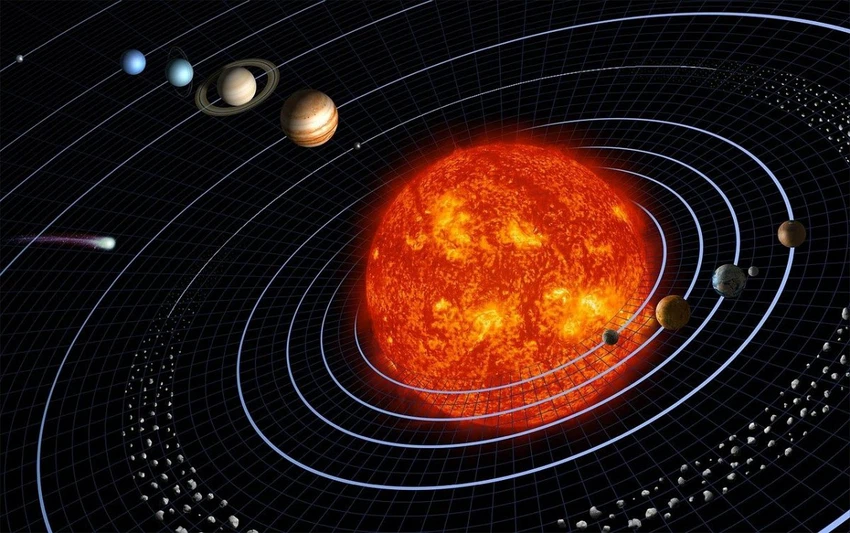Why do planets appear spherical in shape? Is it perfectly spherical?
Arabia Weather - If you consider the planets of our solar system, you will find many differences in size and composition, but they all appear to the naked eye to be “spherical” in shape, well; In fact, not all of them are perfectly spherical, but they appear round to the viewer. Have you asked yourself why the planets look like this? Why not be in the shape of a cube, a pyramid, or even a cylinder? In this article we will discover why the planets are spherical and why not all of them are perfectly spherical.
There are two main factors that contribute to a planet's sphericity: gravity and the properties of the planet itself
Gravity is a fundamental force that acts between two bodies that have mass. The greater the mass of the body, the greater its attraction. Gravity plays an important vital role in the life and formation of planets.
How are planets formed?
The formation of planets begins with the gathering of dust particles into clumps. These clumps gradually grow larger and turn into pebbles and then into larger rocks. The presence of gas in the initial planetary disk helps solid material particles stick together, leading to the formation of larger structures known as “planets.” Small ones, and although some may break off, others persist and serve as building blocks for the planets
Over time, these small planets grow and increase in size and attract more matter until they become one huge body. As this planet continues to grow, its gravity becomes stronger and pulls more matter towards its center, and this continues until the planets become large enough to pass around their main star.
When a planet is forming, its matter is in a liquid state - not necessarily liquid in the literal sense - meaning that it flows in it, and this allows the matter to move easily and arrange itself in a way that is compatible with the shape into which gravity pulls it, which is the spherical shape.
The force of gravity affects the planet equally in all directions, attracting materials towards its center and increasing the density of the planet's core. This gravitational pull causes the planet to take a spherical shape, which is a three-dimensional ball.

Why do planets have a spherical shape?
The sphere is the most symmetrical shape that can be formed with the accumulation of matter. As we mentioned previously, the force of gravity acts equally in all directions, which makes the sphere the ideal shape to resist deformation. If, for example, the shape of the planets is a cube, its corners will be more vulnerable to collision and deformation.
In addition, a sphere has the largest volume for a given surface area, and this means that planets with a spherical shape have more space for their materials compared to a hypothetical planet with a different shape.
Why are the planets not perfectly spherical?
Although all the planets in our solar system may appear perfectly spherical to the naked eye, they are not perfectly spherical, and yet some are more spherical than others. Among these planets, Mercury and Venus are considered the most spherical, while Saturn and Jupiter are the least spherical due to the bulge in their equator.

Why do planets open at the equator?
This is due to the fact that the planets rotate on their axis, when an object rotates the outer edge likes to travel faster than the inner parts to keep up with it. This applies to any rotating object whether it is a large wheel, a propeller, or something smaller such as a small disk, where the outer edge simply has to travel a greater distance in the same time.
At the planet's equator the greatest distance must be traveled to complete one revolution, and although gravity does its best to keep everything together, the planet's rotation produces a centrifugal force - meaning matter wants to fly away - creating a 'bulge'. At the equator where the effect is strongest. This excess expansion is referred to as "tropical bulge."
Is the Earth perfectly spherical?
As with all the planets in our solar system, Earth also has a bulge at its equator, but it is relatively small; The Earth's width at the equator is about 43 kilometers (27 miles) compared to the pole-to-pole measurement. in another meaning; The difference is just over 1/300 of its diameter at the equator. If the Earth were transformed into a sphere with a diameter of one meter at the equator, the equatorial bulge would be only 3 millimeters.
Unlike Earth, Mars has a much larger bulge; About 1/150 of its equatorial diameter but this is still relatively small compared to Saturn which has the largest bulge of all the planets in our solar system. The thickness of Saturn is about 1/10 at the equator compared to its diameter from pole to pole.
Now you know that the planets are round because of gravity and their own properties, but they are not perfectly spherical because of the centrifugal effects of their rotation.
Sources: www.universal-sci.com
Arabia Weather App
Download the app to receive weather notifications and more..



